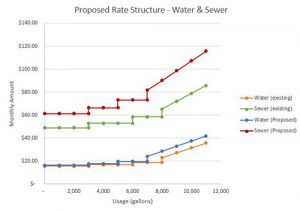
BERLIN – Town officials formally approved the increases in water and sewer rates discussed at this spring’s budget work sessions at a meeting this week.
On Tuesday, the Berlin Town Council approved a resolution increasing water rates 5% and sewer rates 25%. A rate study by Davis, Bowen and Friedel (DBF) indicated that those increases should help the town stop the sewer fund’s practice of borrowing from the town’s general fund.
“The numbers here are the culmination of the work that DBF did analyzing water and sewer expenses and revenues over the last five years,” Town Administrator Laura Allen said.
Allen said the rate study had shown that the town didn’t need to increase its special connection fees as they were among the highest in the area. She said the town was, however, proposing increases to a variety of other fees. In addition to the 5% water rate increase and 25% sewer increase, adjustments have been made to turn-on fees, hydrant permit fees and others.
“If you look at the inflation rate from 2010 to 2019 prices have gone up by about 17%,” she said. ‘The town hasn’t adjusted its sewer and water rates since about 2010.”
According to the resolution presented Tuesday, water billing rates will be $16.37 for those using fewer than 2,999 gallons, $17.67 for those using between 3,000 and 4,999 gallons and $19.64 for customers using between 5,000 and 6,999 gallons. Sewer rates will be $61.16 for the bottom tier of users, $66.26 for those using between 3,000 and 4,999 gallons and $73.06 for those using between 5,000 and 6,999 gallons per month.
Councilman Zack Tyndall asked if the increase in fees would provide the sewer fund with money for capital expenses. Finance Director Natalie Saleh said it would not and that it would just allow the sewer fund to break even.
Allen added that while revenues to the water fund would increase, projections allowed for a slight drop in use.
“We’re making an assumption that folks, when their bill goes up, will start to adapt and use less water,” she said, adding that the revenue projections were estimates. “If we’re good at estimating the impact, our numbers will be accurate.”
Councilman Troy Purnell asked whether Davis, Bowen and Friedel and town staff expected the sewer fund to break even with the increase.
“By the best estimates, as of right now we’re projecting the sewer fund to be about even,” Saleh said. “That’s if we forgo all emergencies and nothing bad happens — we don’t need to improve, repair, replace something major.”
She added that staff would be reviewing financial figures closely going forward.
Resident Jason Walter asked how residents were going to decrease their water use.
“What do you expect the average homeowner to do to conserve water, not flush the toilet?” he said. “It’s not like we have garden hoses running in the yard 24/7.”
Purnell said there were plenty of options available such as water conservation faucets and low-flow toilets.
“Defecate in the street like California?” Walter said. “There’s only so much you can do in a house to not use water. Modern appliances are really efficient. If you’ve got a drippy faucet that’s on you, but most of us don’t.”
Walter added that the town’s higher end users should get more of an impact than residential users. Purnell said they would with the proposed changes.

